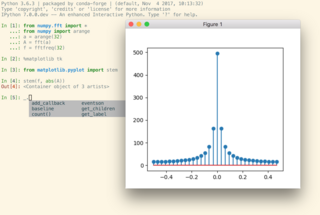
Python is an interpreted high-level general-purpose programming language. Its design philosophy emphasizes code readability with its use of significant indentation. Its language constructs as well as its object-oriented approach aim to help programmers write clear, logical code for small and large-scale projects.

PyQt is a Python binding of the cross-platform GUI toolkit Qt, implemented as a Python plug-in. PyQt is free software developed by the British firm Riverbank Computing. It is available under similar terms to Qt versions older than 4.5; this means a variety of licenses including GNU General Public License (GPL) and commercial license, but not the GNU Lesser General Public License (LGPL). PyQt supports Microsoft Windows as well as various flavours of UNIX, including Linux and MacOS.

PyGTK is a set of Python wrappers for the GTK graphical user interface library. PyGTK is free software and licensed under the LGPL. It is analogous to PyQt/PySide and wxPython, the Python wrappers for Qt and wxWidgets, respectively. Its original author is GNOME developer James Henstridge. There are six people in the core development team, with various other people who have submitted patches and bug reports. PyGTK has been selected as the environment of choice for applications running on One Laptop Per Child systems.
IronPython is an implementation of the Python programming language targeting the .NET Framework and Mono. Jim Hugunin created the project and actively contributed to it up until Version 1.0 which was released on September 5, 2006. IronPython 2.0 was released on December 10, 2008. After version 1.0 it was maintained by a small team at Microsoft until the 2.7 Beta 1 release. Microsoft abandoned IronPython in late 2010, after which Hugunin left to work at Google. The project is currently maintained by a group of volunteers at GitHub. It is free and open-source software, and can be implemented with Python Tools for Visual Studio, which is a free and open-source extension for Microsoft's Visual Studio IDE.
The Web Server Gateway Interface is a simple calling convention for web servers to forward requests to web applications or frameworks written in the Python programming language. The current version of WSGI, version 1.0.1, is specified in Python Enhancement Proposal (PEP) 3333.

eric is a free integrated development environment (IDE) used for computer programming. Since it is a full featured IDE, it provides by default all necessary tools needed for the writing of code and for the professional management of a software project.
CherryPy is an object-oriented web application framework using the Python programming language. It is designed for rapid development of web applications by wrapping the HTTP protocol but stays at a low level and does not offer much more than what is defined in RFC 7231.

PyPy is an alternative implementation of the Python programming language to CPython. PyPy often runs faster than CPython because PyPy uses a just-in-time compiler. Most Python code runs well on PyPy except for code that depends on CPython extensions, which either does not work or incurs some overhead when run in PyPy. Internally, PyPy uses a technique known as meta-tracing, which transforms an interpreter into a tracing just-in-time compiler. Since interpreters are usually easier to write than compilers, but run slower, this technique can make it easier to produce efficient implementations of programming languages. PyPy's meta-tracing toolchain is called RPython.
Tkinter is a Python binding to the Tk GUI toolkit. It is the standard Python interface to the Tk GUI toolkit, and is Python's de facto standard GUI. Tkinter is included with standard GNU/Linux, Microsoft Windows and macOS installs of Python.

IPython is a command shell for interactive computing in multiple programming languages, originally developed for the Python programming language, that offers introspection, rich media, shell syntax, tab completion, and history. IPython provides the following features:
Google App Engine is a cloud computing platform as a service for developing and hosting web applications in Google-managed data centers. Applications are sandboxed and run across multiple servers. App Engine offers automatic scaling for web applications—as the number of requests increases for an application, App Engine automatically allocates more resources for the web application to handle the additional demand.
Web2py is an open-source web application framework written in the Python programming language. Web2py allows web developers to program dynamic web content using Python. Web2py is designed to help reduce tedious web development tasks, such as developing web forms from scratch, although a web developer may build a form from scratch if required.

Pyjs, is a rich web application framework for developing client-side web and desktop applications in Python. The resulting applications can be run in a web browser or as standalone desktop applications.

PsychoPy is an open source software package written in the Python programming language primarily for use in neuroscience and experimental psychology research. Developed initially as a Python library and then as an application with a graphical interface, it now also supports JavaScript outputs to run studies online and on mobile devices. Unlike most packages, it provides users with a choice of interface - they can generate experiments by writing Python scripts, use a graphical interface that will generate a script for them, or combine both methods. Its platform independence is achieved through use of the wxPython widget library for the application and OpenGL for graphics calls. It is also capable of generating and delivering auditory stimuli.

Kivy is a free and open source Python framework for developing mobile apps and other multitouch application software with a natural user interface (NUI). It is distributed under the terms of the MIT License, and can run on Android, iOS, Linux, macOS, and Windows.
PythonAnywhere is an online integrated development environment (IDE) and web hosting service based on the Python programming language. Founded by Giles Thomas and Robert Smithson in 2012, it provides in-browser access to server-based Python and Bash command-line interfaces, along with a code editor with syntax highlighting. Program files can be transferred to and from the service using the user's browser. Web applications hosted by the service can be written using any WSGI-based application framework.

Astropy is a collection of software packages written in the Python programming language and designed for use in astronomy. The software is a single, free, core package for astronomical utilities due to the increasingly widespread usage of Python by astronomers, and to foster interoperability between various extant Python astronomy packages. Astropy is included in several large Python distributions; it is part of package managers for Linux and macOS, the Anaconda Python Distribution, Enthought Canopy and Ureka.









